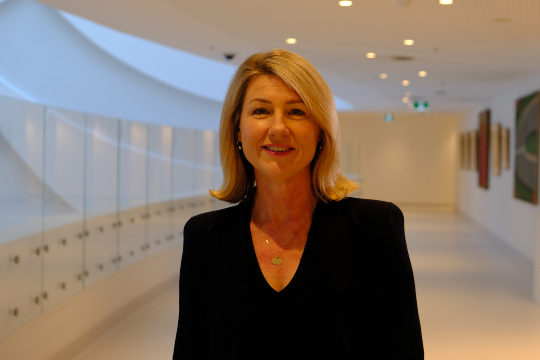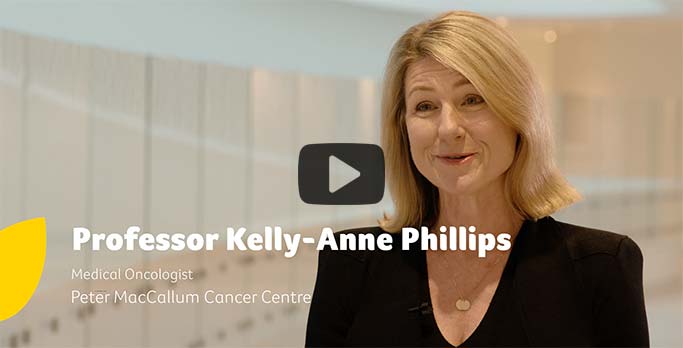
Professor Kelly-Anne Phillips, medical oncologist and Colebatch Fellowship recipient
Chemotherapy used to treat breast cancer can cause menopause to occur earlier than it otherwise would. After menopause, women can't conceive children with their own eggs.
For young women undergoing cancer treatment, early menopause may mean coming to terms with loss of fertility.
This can have a significant emotional impact and affect body image and relationships - particularly if the woman is still considering starting a family or having more children.
Research led by Professor Kelly-Anne Phillips, medical oncologist at the Peter MacCallum Cancer Centre, found that the medication goserelin (Zoladex) significantly reduces the risk of early menopause for young breast cancer patients.
“Our research showed that pre-menopausal women with breast cancer who received the drug goserelin during chemotherapy had a 70 per cent reduction in their chance of early menopause,” said Prof Phillips.
“They were twice as likely to have had a baby after the end of their cancer treatment, compared to women who didn’t receive the injections.”
Breast cancer is the most common cancer diagnosed in Australian women aged 25-49 years, so protecting fertility in young patients is important without impacting cancer outcomes.
At the same time, Prof Phillips said the research was relevant for all pre-menopausal women with cancer, regardless of their reproductive plans.
“Early menopause brings with it the potential for increased risks of osteoporosis and other long-term health problems, so even if a pre-menopausal woman with cancer doesn’t want children, avoiding chemotherapy-induced menopause is still important,” said Prof Phillips.
The study of 218 women world-wide has led to a major breakthrough in the treatment of young breast cancer patients.
“This relatively simple and accessible treatment has been incorporated into international guidelines on how to treat young women with cancer,” said Prof Phillips.
“There’s also potential that this treatment may benefit young women with other cancers such as lymphoma.”
Professor Phillips was the first recipient of Cancer Council’s Colebatch Fellowship in 2005. She received funding for five years and one focus of her research was the prevention of early menopause in breast cancer patients.
This led to the Australian government, in late 2017, adding goserelin (Zoladex) to the PBS to help prevent early menopause for not only young women with breast cancer, but any cancer requiring chemotherapy.
Danielle Spence, Head of Strategy and Support at Cancer Council Victoria said the Colebatch Fellowship was one of its most prestigious research grants.
“The Colebatch Fellowship funds the most outstanding mid-career cancer researchers in Victoria with the drive and aspiration to become a leader and the vision to achieve the next cancer breakthrough,” she said.
“The research grant is funded through donations, generously contributed by Victorians.”
The Fellowship was named in memory of Dr John Colebatch AO (1909 – 2005) to mark his pioneering work in the field of paediatric haematology and clinical trial practice in Australia.
Colebatch Fellowship recipients
Previous recipients of the Colebatch Clinical Research Fellowship, Professor Kelly-Anne Phillips and Professor Sherene Loi share what it's meant receiving this prestigious award and son of Dr John Colebatch, Tim, talks about his father's work.

Keep reading
The Quitline is already receiving calls from people seeking help to quit vaping.
Read more
Cancer Council's Responding to Emotions in Cancer course has been developed to support clinical staff to manage difficult conversations.
Read more
The Clinical Network Executive Committee welcomes a new Chair and Co-Chair and identifies priority areas for its work informing Cancer Council Victoria's policy and advocacy objectives.
Read more